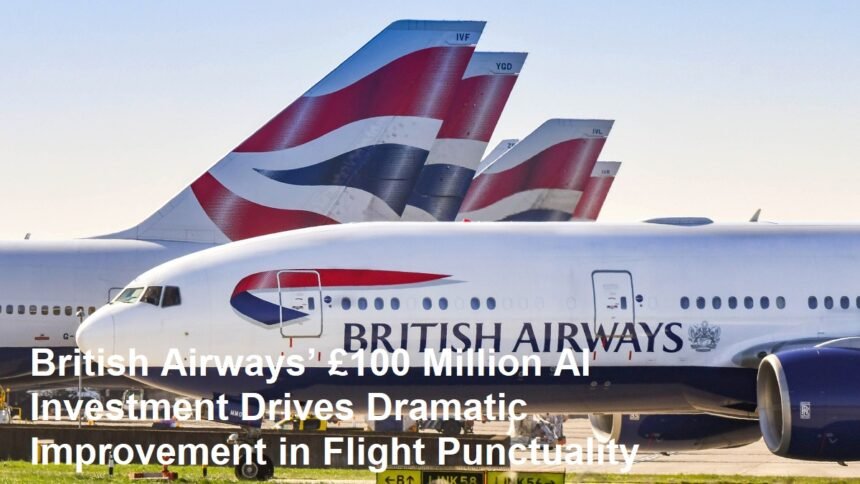British Airways, one of the world’s leading airlines, has recently announced that its substantial investment of £100 million in artificial intelligence (AI) technology has yielded dramatic improvements in flight punctuality. This milestone marks a significant advancement in the airline’s operational efficiency and customer service, showcasing how cutting-edge technology can transform traditional industries like aviation.
Flight punctuality has long been a critical metric for airlines, directly impacting customer satisfaction, operational costs, and overall brand reputation. Delays can cause a cascade of disruptions, affecting connecting flights, crew schedules, and airport logistics. Recognizing these challenges, British Airways embarked on a strategic initiative to harness AI’s potential to optimize various aspects of its operations, aiming to enhance on-time performance and deliver a smoother travel experience.
The £100 million investment has been channeled into developing and deploying sophisticated AI systems that analyze vast amounts of data in real-time. These systems integrate information from multiple sources, including weather forecasts, air traffic control updates, aircraft maintenance records, and passenger flow data. By processing this complex data, AI algorithms can predict potential delays, optimize flight routes, and improve turnaround times on the ground.
One of the key applications of AI at British Airways is in predictive analytics. The airline uses AI models to forecast disruptions before they occur, allowing proactive measures to be taken. For example, if the system detects a high likelihood of adverse weather conditions along a flight path, it can suggest alternative routes or adjust departure times to minimize delays. Similarly, AI can anticipate maintenance issues by analyzing aircraft sensor data, enabling timely interventions that prevent unexpected breakdowns.
Another significant benefit comes from AI-driven resource management. Airports are complex environments where efficient coordination of gates, ground crew, and baggage handling is essential. British Airways’ AI tools optimize these logistics by predicting peak demand periods and allocating resources accordingly. This reduces bottlenecks during boarding and disembarkation, speeding up aircraft turnaround and contributing to improved punctuality.
The impact of these AI-driven improvements is evident in British Airways’ recent performance metrics. The airline reports a marked increase in the percentage of flights departing and arriving on time, surpassing industry averages. Passengers have experienced fewer delays and smoother connections, enhancing overall satisfaction and loyalty. Moreover, improved punctuality translates into cost savings for the airline by reducing expenses related to compensations, fuel consumption during extended ground times, and crew overtime.
British Airways’ success with AI also reflects a broader trend in the aviation industry, where digital transformation is becoming essential to meet growing passenger expectations and operational complexities. Airlines worldwide are investing in AI and machine learning to enhance safety, efficiency, and customer experience. British Airways’ £100 million commitment underscores the scale and seriousness of this technological shift.
The airline has emphasized that AI is not replacing human expertise but augmenting it. Pilots, air traffic controllers, and ground staff continue to play vital roles, with AI providing them with enhanced tools and insights to make better decisions. This collaboration between technology and human judgment ensures that operations remain safe, flexible, and responsive to real-world conditions.
Looking ahead, British Airways plans to expand its AI capabilities further, exploring applications such as personalized passenger services, dynamic pricing, and automated customer support. The airline is also investing in training its workforce to effectively leverage AI tools, fostering a culture of innovation and continuous improvement.
In conclusion, British Airways’ claim that its £100 million investment in AI has dramatically improved flight punctuality highlights the transformative power of technology in aviation. By integrating advanced data analytics, predictive modeling, and resource optimization, the airline has enhanced operational efficiency and passenger satisfaction. This achievement not only strengthens British Airways’ competitive position but also sets a benchmark for the industry’s digital future. As AI continues to evolve, its role in shaping safer, more reliable, and customer-centric air travel will undoubtedly grow, benefiting airlines and travelers alike.









